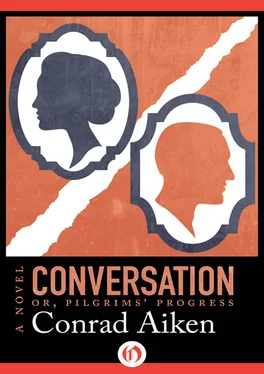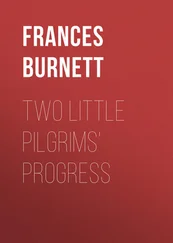“Yes, I know. And I can only stay a minute now. But there is something I thought you ought to hear, and I hoped I’d catch you by yourself. I thought it wouldn’t do any good to let Karl and the girls in on it.”
“Yeah?”
“May be nothing serious, either; but old George Pierce, across the river, has heard about you, mostly I’m afraid, from Enid, and got on his high horse, and of course he might make trouble.”
“I get you — the civic spirit.”
“I’m afraid so. Incidentally, I don’t want to know what you don’t want to tell me, but have you got any plans yet?”
“No. I haven’t. But don’t worry, kid — don’t you worry. I’ll be all right.”
“I just thought I’d better tip you off, anyway.”
“Sure. Thanks. And I appreciate it, Timothy. But I’ll be all right.… By god, isn’t it a wonderful night? Doesn’t this make you want to paint? If I were only a poet, now, with a lot of succulent polysyllables — what’s the word, sesquipedalian? I have a fondness for long words, you know — it’s supposed to be a symptom for something — that’s what Paul says!”
He dropped his cigar into the dark water, where it went out with a faint pssst , stared downward in amused silence for a moment, then added:
“But it was left out of me, I guess — the best I can do is help the ones that have got it. You know, I’d like to give you a hand, Tip — you oughtn’t to be sweating at teaching, you ought to go abroad.”
“Abroad! Don’t make me laugh. Damned nice of you, Jim, but as a matter of fact I’m a lot better off than most.”
“Well, artists ought be supported by the state—”
“In Utopia, yes!”
“In Utopia. Look at those shells there, on that rock — what are those, kid?”
“Those? Mussels.”
“Are they good to eat?”
“Sure they are — delicious, you steam them like clams.”
“We’ll have to try them. If those girls could even learn to build a fire — this morning they damned near smoked the house out!”
He gave a bitter little laugh as they turned, they were both silent till they had reached the steps to the front porch of the house, emerging once more into the moonlight. The short grim smile under the sharp visor again, the detached smile under the hooded but kindly eyes — he was putting out his hand.
“Well, thanks for coming over, kid — you’re honest, the way I like people to be honest. Will I be seeing you tomorrow?”
“I’ll try to drop in, in the afternoon.”
“I wish you would. It might help me out. You never know.”
“Okay, Jim, I’ll try.… Good night.”
“Good night, Timothy.… This Pierce guy, is he a friend of yours?”
“Yes. He’s a good fellow, too, you know.”
“Yes, I guess I know. Good night!”
“Good night.”
He watched the tired figure go slowly up the stairs, disappear into the heavy shadow of the porch, heard the door shut behind him — he had gone back into his Utopia, his singular dream of Utopia. Gone back to Karl, to Kitty, to Lorna — to the cynical Karl, who used him and sponged on him, to Kitty who hated him, to Lorna who perhaps loved him, perhaps didn’t, perhaps only used him too — Christ, what a tragic joke it all was, what a hell of a Utopia that was! He stood still, listening, for a moment — he thought he had heard a sound as of angry voices from one of the open windows upstairs, a sound of quarreling, two voices, male and female, in brief sharp interchange — but if so, everything was again silent. Utopia, by god—! It was more like a crucifixion.
And this gaunt blazing-eyed woman, Lorna — where the devil had she suddenly come from, how the devil had she got hold of him — with two children, according to Karl (who thought it was all a wonderful joke), and a tubercular husband in the New York Customs House — and she planning to be a concert pianist!
It was cold, he walked quickly — looking up, he saw that the moon was now almost directly overhead, swimming rapidly, dizzily, like a spun silver coin, through a shoal of silver mackerel. It gave to the whole night a sense of ominous hurry, a sense of finality, of falling, of impending end. The downward-going vortical swirl of everything, of all nature, the swirling and inward funneling death, like those marvelous late Van Goghs, where all shapes seemed to be centrifugally or centripetally self-consuming — trees burning spirally on whirling and burning hillsides, burning their own doomed intensity, the hillsides themselves an exhausted flame of grass and bushes, the very rocks exhaling fiercely away in the final ecstatic “Ahhhh—!” of creative death. If one could only get hold of that — strip one’s vision nakedly down to that—
The familiar feeling of breathlessness again, of defeat, of closing one’s eyes, lest one see too clearly the very limitedness of one’s own vision, the trembling ineffectiveness of one’s own hand, the fumbling quick makeshift which, at the last moment always, and in a panic, one had to substitute for the real thing! He entered by the front door — the lilacs could wait till morning, to be a surprise — and stood still by Enid’s empty chair in the disordered studio. The three half-burned pine logs, glowing and hissing, to be up-ended against the sooty sides of the brick fireplace — the lamp on the bookcase to be blown out, with its little cold after-smell of kerosene — the two-toned squeak of the hall door — his hands to be scrubbed in the small bathroom, with the nailbrush, to get the grit and sand from under his fingernails — the everlasting toothbrush, the everlasting voracious w.c. — and then the quick climbing of the stairs, taking his candle, the quiet undressing, lest he wake Ee — or was she still awake, lying awake? — and the noiseless getting into bed in the small moon-flooded room …
Ee’s door was closed.
The house was silent.
“In the morning, (16th November,) as soon as we could see the trace, we proceeded on our journey, and had the track until we had compassed the head of a long creek, and there they took into another wood, and we after them, supposing to find some of their dwellings; but we marched through boughs and bushes, and under hills and valleys, which tore our very armour in pieces, and yet we could meet with none of them, nor their houses, nor find any fresh water which we greatly desired and stood in need of, for we brought neither beer nor water with us, and our victuals was only biscuit and Holland cheese, and a little bottle of aquavite, so as we were sore athirst. About ten o’clock we came into a deep valley, full of brush, wood-gall, and long grass, through which we found little paths or tracts, and there we saw a deer, and found springs of fresh water, of which we were heartily glad, and sat us down and drank our first New England water with as much delight as ever we drank drink in all our lives.… There grew also many small vines, and fowl and deer haunted there; there grew much sassafras. From thence we went on and found much plain ground, about fifty acres, fit for the plough, and some signs where the Indians had formerly planted their corn.…”
— JOURNAL OF THE PILGRIMS
Blue, blue-bright, gray-bright, gray — the fog-bright sun, the sun-bright fog — there had been a change overnight, a sea change, the sea had come rankly inland and upriver, the small screened window was pale with it, the fine wire screen hung softly luminous with sea dew. Sounds of dripping, too; the heavy patter, irregular and slow, of fog-drops from the poplar trees on the low roof overhead; and the thud of a fallen twig; or the sliding scrape of a dead leaf. But the change was not only this change, the change of weather — it was also something else, there was another change as well — older and stranger shapes hung in the softened light, melted into it, came out of it, were a part of it — and as he looked, or half looked, listened, or half listened, the dream and the actuality seemed but indivisible aspects of the same thing. The indiscreet dream about Nora—! Sharply and deliciously the slow bright turmoil of obscure shape swam upward out of the shadow, as if one glimpsed, through dark water, the turning and involved rondures of a sculptured group, a hand, a face, lifted, lifted as if alive, and then gone. Gone, but the emanations, the meanings, the thrust of the hand, the dark look of the face before it turned downward and under, hung, sang, vibrated, shone, in all shape and sound, ticked with the watch under the pillow, dripped with the sea fog, gave form to the window, extended themselves in and out of the fog-soft, fog-bright room, seemed even co-dimensional — like an aura — with himself. An aura? But which was aura and which was reality? This body — which jumped from bed, hurried down the stairs, shaved its blond face in a small dull square of mirror and plunged itself into the deep green-cold bath — which listened, as it pulled on its socks, to Buzzer singing in her room, or, as it pulled on the khaki trousers, to the church clock striking — was this, after all, only an aura for the dream? Was the whole world only an aura, a sort of Saturn’s ring, for the strange and delicious dream, and the dream itself the only reality—? Was that sculptural dream the real core of the world, its only true meaning?
Читать дальше












